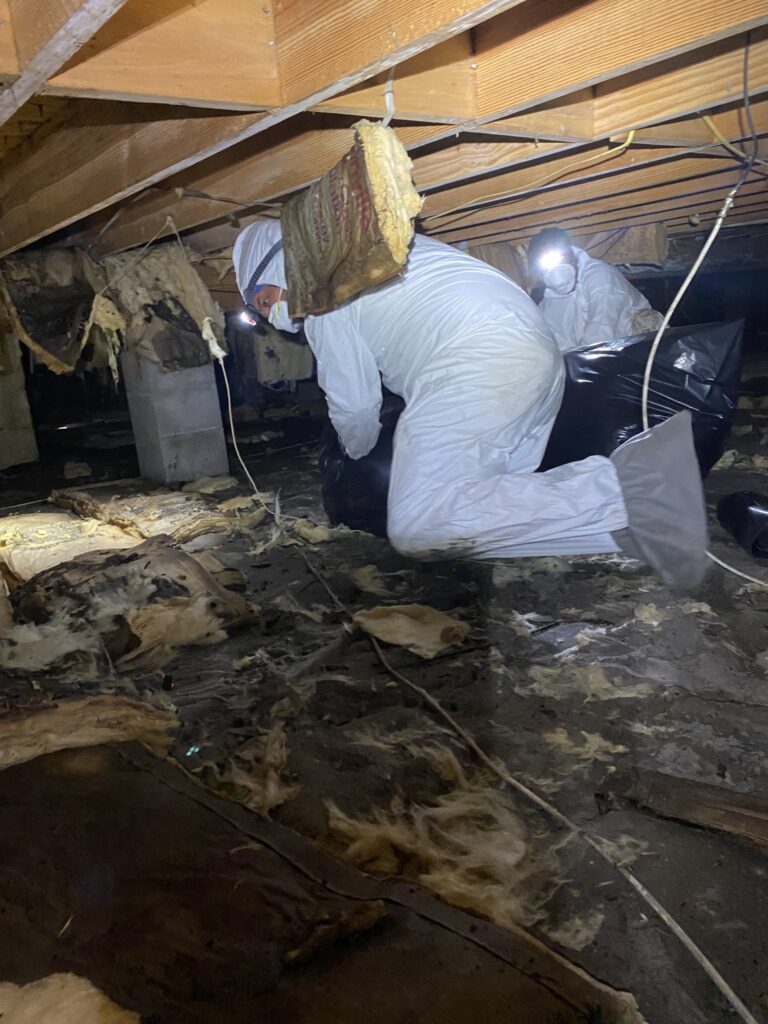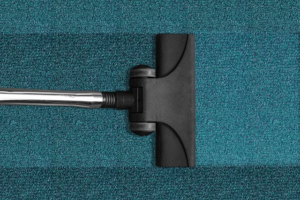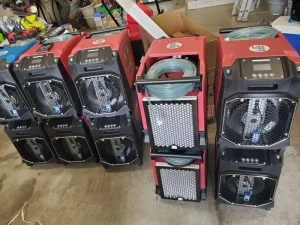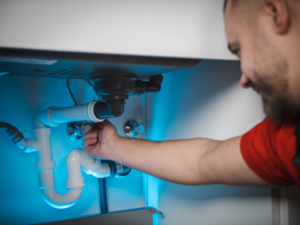Basement floods are some of the most common types of flooding homeowners encounter. Water heaters break, pipes burst, and even sewers can back up.
Luckily for homeowners around Nashville, we aren’t at the biggest risk for flooding— well, a natural one, at least. In fact, there’s only a 26% chance of flooding events in houses within Special Flood Hazard Areas during a 30-year mortgage.
No one likes coming home to a flooded basement, but if you do, it’s important to have a plan so you can act quickly. For this, TN Flood Kings experts have compiled a list of steps for homeowners facing basement flooding for any reason. Flood damage can be a homeowner’s nightmare; if your basement flooded, don’t be afraid to call in help.
Flooded Basement 101: How to Start The Basement Flood Cleanup Process
Basement cleanup procedures are pretty standard. Follow our instructions below to mitigate damage, prevent health risks, and start the restoration process.
Safety First
As much as you may be tempted to splash through basement floods to save your furniture and belongings, don’t.
Before jumping in, ensure you know whether or not any electrical outlets are in the affected area to avoid electrical shock. For maximum safety, turn off your power completely.
Next, you need to figure out water quality. There are three categories of floodwater quality:
- Clear Water: clear water is clean water with no contaminants that pose health threats. This type of water typically comes from inside the house, from incoming water pipes.
- Grey Water: grey water typically comes from a burst pipe or leaky appliance and is potentially hazardous, containing waste from washing clothes, running the dishwasher, or bathing.
- Black Water: black water comes from sewage backups, heavy rains, kitchen, or bathroom leaks and can be incredibly toxic, containing contaminants like bacteria, pesticides, and raw sewage.
No matter the category of water, make sure anyone going into the flooded basement wears rubber boots, rubber gloves, a face mask, safety goggles, and clothes that can be thrown away if necessary.
Find The Cause Of The Damage in Your Flooded Basement
Once you know the water is under control, and you are sufficiently protected, it’s time to walk through your basement for a thorough inspection. Take a phone or camera with you, as you need documentation to take to your insurance company.
Try to identify where the water is coming from; it’s ok if you can’t find it right away, but the sooner, the better. Remember, it can be anything from broken pipes or burst water heater to a backed-up sewer system or leaky foundation, so it may not be obvious, and you may need to call in a professional to find it.
Remove Excess Water with a Sump Pump Or Wet Dry Vac
The longer standing water sits in your flooded basement, the more damage your house will sustain.
To minimize damage, use a sump pump or wet vacuum to funnel water out of the affected areas as soon as possible.
Dry Out Your Basement
Once the water is mostly gone, you can open windows, set up fans, and run dehumidifiers to help the basement dry out. Air circulation will be your best friend to help dry the area and keep the air clear.
The drying process can last days, even weeks, pending the size of your basement.
Clear Out the Rooms
Start collecting furniture and loose items, deciding which you will salvage and which you will toss.
Try to DIY your furniture repair, or rely on a professional restorer. For anything else, you need to dry, clean, disinfect, and dry again before returning them. It’s incredibly time-consuming, but it’s important to prevent mold and prevent further damage.
Don’t forget to make a list of damaged items and take pictures for your insurance claim.
Clean and Disinfect
Once your basement is dry and you’ve gotten loose items and furniture out of the way, it’s time to start cleaning the mess. A shop vac is super handy for these types of messes, and you can generally get away with standard disinfectant solutions.
If any of your flooded basement rooms were carpeted, then you need to pull up the carpet and throw away the carpet pad; based on the water quality, you may be able to save the carpet. The pad, however, will need to be replaced.
You can use mild soap and warm water to clean most surfaces or a mixture of vinegar and water. Some people like to mix bleach and water, but you’ll need to be more careful— bleach can harm carpets, upholstery, and humans.

Inspect Basement Walls and Ceilings for Mildew or Mold Growth
Flooded basements are prime real estate for moisture-related issues like mold growth, including dangerous black mold. Check for any discoloration on your basement walls or ceiling, spores, or a musty smell.
If you notice any of these signs, call a mold remediation expert as soon as possible to restore your home and protect your family.
Basement Flooding Repair: Restoring Your Home After Water Damage
Flood damage does more than create a mess of silt and bacteria. It can damage your floors and walls, and even compromise your home’s structural integrity. Anything wood is at risk of warping or developing rot, and your fabrics may absorb harmful bacteria from the water.
The restoration process can vary based on the extent of the damage. You may only need to repair some furniture, sanitize fibers, and repair some damaged drywall, or you may need to rip out over a foot of drywall and replace your insulation.
The more extensive the structural damage, the more likely you should call a professional restoration company. Professional restorers have the right tools and gear to do the necessary repairs right, saving your time, money, and unnecessary health risks.
How To Prevent Basement Flooding
Some steps you can take to protect yourself from future flooding incidents include:
- Schedule regular plumbing inspections
- Clean gutters and downspouts
- Install a backwater valve
- Seal any cracks in your home’s floors, foundations, walls, and windows
- Set up a sump pump
- Invest in a wet-dry vacuum
- Get flood insurance
Flood insurance will help cover the cost of repairs and replacements in your home, while regular inspections of your pipes and appliances help to lower the risk of leaks or other issues. Cleaning gutters and downspouts ensures that extra water during heavy rain has a place to go; it also helps prevent ice damming in the winter.
If you have any cracks along the exterior of your home, this can let in water which slowly damages your home and can lead to mold.
Finally, sump pumps and wet-dry vacuums can be really helpful in removing excess water from your flooded basement so you can focus on saving your belongings.
For Flooded Basement Cleanup, Call TN Flood Kings
A flooded basement is never fun. If it happens to you, jump into action quickly to avoid lasting structural damage, expensive repairs, and mold and mildew growth.
Your best bet is to leave water extraction and repairs to the professional. If you need to enter your flooded basement before help arrives, always wear protective gear.
Don’t tackle it alone — call the water damage restoration experts at TN Flood King.
Flood Kings has served Nashville and Mid-Tennessee for the past fifteen years. We’ll help you make changes to prevent future flooding and let you know if you are in an area prone to more flooding than others.
Call us anytime at 615-477-9968; we’re here 24/7 to help with your emergencies.








